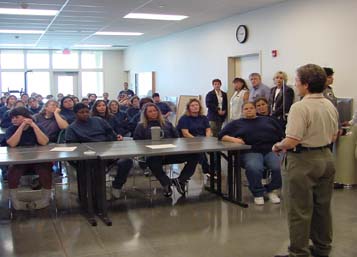|
Oregon's Correctional Institutions
|
|||||||||

Oregon's prisons are safe, civil and productive so inmates can pursue the goals specified in their corrections plans. Additionally, high-caliber staff help shape positive behavior. To hold inmates accountable for their actions, the division's responsibilities encompass prison management, health services, inmate transportation, security threat group (gang) management, emergency preparedness, and most inmate work activities.
|
|||||||||
|
Operations
|
|
Operations
|
|||||||
